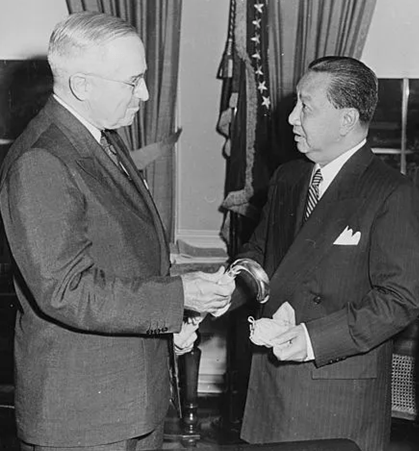Kissinger Doctrine: Juris Doctors Must Weigh Their Balls Occasionally
Letter to the Philippines Daily Inquirer.
Dear Editor, this references the June 26, 2024 article of your Jane Bautista, about law professors from San Beda University, led by its Law Graduate School Dean Ranhilio Callangan Aquino, calling on the United States to address its commitment to meet “common dangers” cited in Article IV of the Mutual Defense Treaty, as “present conditions already trigger its operative provisions”.
First, the academics did not specify how they expected the US to honor its obligations, as the same Article is expressly premised “in accordance with its constitutional processes”. As I assume they were lawyers, I expected them to be more directional, not vague.
Quite the opposite, they appeared confused themselves, saying “We do not call for the commencement of armed hostilities…” If so, towards what direction were they egging the Americans to act?
They also made a fool of themselves because the Philippine government has not invoked the initialization of the treaty. The proper response would have been to push the President Marcos, not Biden, to proceed with an invocation. They were imposing on the US government feigning as if they were American citizens demanding constituency action.
The second portion of the article was not only incompetent but devious.
The law professors also noted Article V of the same treaty as saying that an “armed attack” covers those made on the metropolitan territory of either party, on island territories under its jurisdiction in the Pacific, or its armed forces, public vessels, or aircraft in the Pacific.
This is a faithful citation of the MDT.
But the professors assumed the occurrence of an “armed attack”. The position of the Philippine government is there was none, which precisely precluded the invocation of the treaty.
(At this juncture I respectfully refer the law faculty of San Beda to go back to the library and study Article 51 of the Charter of the United Nations and its implications that deal with “armed attacks”.)
That notwithstanding, they loaded it with malicious fallacy.
Aquino noted that according to Paragraph 14 of the US and Philippines Bilateral Defense Guidelines signed on May 3, 2023, an “armed attack in the Pacific” also includes incidents anywhere in the South China Sea on either Philippine or US armed forces, including their Coast Guards, aircraft, or public vessels.
The nutty professors are playing with fire here. To dismiss these matters simplistically, as mere “operational provisions”, is dangerous. Inserting the 2023 guideline “anywhere in the South China Sea” is not only the height of incompetence but poisons the Mutual Defense Treaty.
This is a substantial revision of the 1951 treaty that cannot be an action initiated by the defense departments of both countries, but necessarily, by the Philippine Department of Foreign Affairs and the State Department of the United States. Both the presidents of the Philippines and United States must approve the amendment that must also be further ratified by both the Senates of the Philippines and the United States.

The Kissinger Doctrine
For the education of the general public, and in interest of truth and equal space, may I draw your attention to The Kissinger Doctrine pertaining to the applicability of the Mutual Defense Treaty.
When in the early seventies, President Ferdinand Marcos Sr. started occupying islands in the South China Seas, particularly the Spratlys, US Ambassador to the Philippines William H. Sullivan sought clarification from the US State Department about treaty enforcement.
Digging deep into the US archival database, Henry Kissinger telegrammed a June 9, 1975 memorandum by Secretary of State Henry Kissinger, expressing the legal interpretation of US commitments under the MDT. (You can access this at https://aad.archives.gov/aad/createpdf?rid=172445&dt=2476&dl=1345)
The USAF Commander-in-Chief in the Pacific based in Hawaii was also furnished the document entered as “State Secret” which was only declassified in 2006.
The memo was very specific and leaves nothing to the imagination:
“In the US government (USG) view, Spratly Islands do not fall within either of the first two categories of Article V relating to territories.”
Kissinger explains the inapplicability,
FIRST CATEGORY: “First category evidently covers those territories over which a party is recognized as sovereign.
“As you are aware, USG regards question of sovereignty over Spratlys (including “Freedomland” or “Kalayaan”) as undetermined, and we take no position on merits of claims of various disputants.
“We note that at time MDT [was] signed, GOP [government of the Philippines] had asserted no claim to any of Spratly Islands, and had protested neither Vietnamese nor Chinese claims, which had been reiterated at time of negotiation of [the] 1951 Japanese Peace Treaty. USG announced publicly at that time it considered sovereignty question undetermined.
“Furthermore, Spratly Islands all fall out- side Philippine territory as ceded to us by 1898 treaty with Spain.”
The treaty also had a bill of particulars. “USG maps accompanying presentation of MDT also exclude Spratlys from territories covered by MDT.”
What about island territories under the SECOND CATEGORY?
“4. [The] second category, island territories under either party’s “jurisdiction”, was intended to cover other territory which a party administered by international agreement but was not sovereign over, e.g., UN [United Nations] trust territories and (at that time) Okinawa.”
The interpretation was so clear it did not allow any exdceptions: “We are not aware of any Philippine-administered territory falling within this category.
What about the aspect of “armed attack” under the THIRD CATEGORY?
“Under most foreseeable circumstances, the treaty would apply if either party were attacked on high seas or in international air space.”
Almost all of the South China Seas is claimed by China as territorial seas, specifically the waters of the Spratlys, Paracels, Pratas, Hainan and the Penghu (Pescadores). What this suggests is that there are no high seas in the South China Seas that makes it not part of the Pacific.
Section 8 of the declassified document pertains to attacks on Philippine forces present in third countries, which is irrelevant this discussion. But later Kissinger made a careful distinction, “Deployment for defense of third country territory, however, is fundamentally different from case where deployment is for purpose of enlarging Philippine territory.”
To be more precise, he said hypothetical attack on [Philippine] garrisons in Spratlys presents different case in the sense that the US government which considers sovereignty issues therein as undetermined, obviously has not recognized sovereignty of any third state over islands occupied by Philippine government.
Sadly, Secretary of State Kissinger specifically cited a decisive irony, “we have also not recognized [Philippine] sovereignty over islands.”
In this situation, he said “while the US would not term Philippino (sic) occupation as illegal invasion of another state, neither can we term this deployment as aspect of collective defense purpose of Mutual Defense Treaty.
Rather, Kissinger viewed view purpose of [Philippine] garrison as establishing and enforcing a claim to sovereignty over openly disputed territory. “MDT does not obligate us to support this type of deployment in event of armed attack.”
He emphasized, “We would emphasize as well that in our view territorial defense commitments of parties are embraced in first two categories of Article V. We do not consider that commitment in event of attack on forces can be boot-strapped into commitment for defense of territory not included in first two categories by deploying forces in such territory.”
Driving the final nail in terms of realpolitik, one of the best diplomats the US has ever produced, concluded, “As a practical matter, we see precious little chance Congress or the American people would support US intervention in Spratly dispute.
“If the [Philippine] garrisons ever were attacked, it seems to me less harmful politically to deny our obligations on legal grounds, than to leave unfulfilled an acknowledged commitment.”
Horse pucky
This issue more than clarified, the “iron-clad” commitment of President Joseph Biden and Defense Secretary Lloyd Austin to Philippine, has just been reduced to an obnoxious horse pucky.
Austin himself was asked during the recent Singapore Dialogue, “Would the U.S. government interpret a Filipino citizen or service man being killed as an act of war and would that invoke a mutual defense treaty?
The US defense secretary gave a vague and long, roundabout and evasive answer: “Let me begin by saying that our commitment to the Mutual Defense Treaty is ironclad. No questions, no exceptions. Ironclad. I won’t speculate on any hypothetical situation… There are a number of things that can happen at sea or in the air, we recognize that. But our goal is to make sure that we don’t allow things to spiral out of control unnecessarily. And again, I will not speculate on any one thing or another. I will continue to emphasize that our commitment to the Mutual Defense Treaty is ironclad.”
The did not sound ironclad to me. It sounded more like Secretary of State Hillary Clinton’s doublespeak to a similar question on June 22, 2011, “The United States honors our mutual defense treaty and our strategic alliance with the Philippines. I’m not going to discuss hypothetical events. But I want to underscore our commitment to the defense of the Philippines.”
The reason for this is explained by US Ambassador Harry Harris in his reply to a podcast question by Raymond Powell, a former US Airforce officer now serving the US Naval Institute.
“We don’t recognize the territorial claims that the Philippines has, even though those are in (its) exclusive economic zones at question at the present time are at Scarbough and Second Thomas Shoal. Those are contested space.”
Powell’s transparency initiative Project Myoushu last year aimed at delving a reputational cost to China by fishing for a false flag with its coast guard, was an utter failure. The project conducted in connivance with Commodore Jay Tarriela, a US-Japan asset insertion into the Philippine Coast Guard, instead led to a better understanding of China’s narrative on its sovereignty red line and rationale in law enforcement particularly in Ayungin and Scarborough Shoals.
As to why Ranhilio Aquino-types and lawyers are easily misled to considering the Mutual Defense Treaty was entered into for purposes of war, firstly they are in denial of a dispute, and secondly, they jumped to Articles IV and V right away without reading Article I, which states:
“The Parties undertake, as set forth in the Charter of the United Nations, to settle any international disputes in which they may be involved, by peaceful means…”
I went to San Beda College for 15 years from grade school to college. But being a firm believer that the quality of education is only as good as its faculty, I will no longer send any of my children and grandchildren to this institution that has lost its gravitas.#
Adolfo Quizon Paglinawan
is former diplomat who served as press attaché and spokesman of the Philippine Embassy in Washington DC and the Philippines’ Permanent Mission to the United Nations in New York from April 1986 to 1993. Presently, he is vice-president for international affairs of the Asian Century Philippines Institute, a geopolitical analyst, author of books, columnist, a print and broadcast journalist, and a hobby-organic-farmer.
His best sellers, A Problem for Every Solution (2015), a characterization of factors affecting Philippine-China relations, and No Vaccine for a Virus called Racism (2020) a survey of international news attempting to tracing its origins, earned for him an international laureate in the Awards for the Promotion of Philippine-China Understanding in 2021. His third book, The Poverty of Power is now available – a historiography of controversial issues of spanning 36 years leading to the Demise of the Edsa Revolution and the Forthcoming Rise of a Philippine Phoenix.
Today he is anchor for many YouTube Channels, namely Ang Maestro Lectures @Katipunan Channel (Saturdays), Unfinished Revolution (Sundays) and Opinyon Online (Wednesdays) with Ka Mentong Laurel, and Ipa-Rush Kay Paras with former Secretary Jacinto Paras (Tuesdays and Thursdays). His personal vlog is @AdoPaglinawan.
Email: contact@asiancenturyph.com
Facebook: https://www.facebook.com/asiancenturyph/
Twitter: https://twitter.com/AsianCenturyPH








